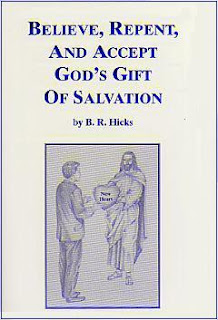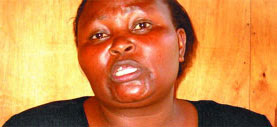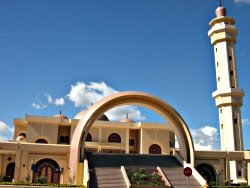IV. The Lord Jesus Christ
This week, we continue examining CGC's teaching on Jesus Christ. After looking at the beginning of Jesus and the relationship of Jesus and the Word, we now turn to the history of the Lord Jesus Christ.
C. The History of Jesus
Throughout the history of this creation, God has been working out his plan to bring Jesus into the world. This plan begins with Adam-female and the promise God gave to her after the Fall. "When the Bible speaks about Jesus' being the Seed of Woman, it refers is [
sic] to the Seed of Promise of the Saviour's Humanity, the Promise given to Adam-female."
[1] This promise continued from Adam-female all of the way to Abraham. In Abraham, God's plan took another step forward. "To Abraham, God gave another Seed, the Promise of the
Divine Seed of the Christ. Abraham, then, had two Seeds: the Seed of Promise of the Saviour's Humanity and the Seed of Promise of His Divinity."
[2] Both of these seeds were carried through Abraham's descendents until King David. "Jesus' Humanity Seed and Christ's Divine Seed were passed along together until they finally reached King David, in whose loins they became divided into two separate streams of revelation, The Humanity Seed . . . traveled down through the lineage of Nathan. The Divine Seed of Christ . . . traveled down through the lineage of Solomon."
[3]
The division of these seeds continued until the time came for the Messiah to come to earth. Joseph held the divine seed. "Joseph, to whom the Virgin Mary was espoused, was of the lineage of Solomon. . . . Although he possessed the Divine Seed of Promise, Joseph could not pass it through His natural, physical loins because the Messiah was ordained to be born of a Virgin."
[4] Mary had the humanity seed. "Mary, as a descendent of Nathan, carried the Humble Seed of Promise of the Redeemer's Humanity. Not until she became espoused or engaged to Joseph did she receive the Divine Seed of Promise of the Christ."
[5] Through the engagement of Joseph and Mary, Mary possessed both seeds. At God's appointed time, the two seeds were united. "The Seeds did not become one in her womb until the Glory Cloud of the Holy Ghost overshadowed her as she started testifying to Elizabeth about the Promise the Angel had given her. At that moment, the Divine Seed of the Christ from the Father joined itself to the Humanity Seed that Mary carried."
[6]
Consequently, Jesus Christ was born. However, a valid question arises: if the Word of God was joined to Jesus when he was originally begotten, then how does this joining relate to the union of the divine seed with the humanity seed? Hicks' answer seems ambiguous. When considering the titles of Jesus, she separates the titles "Son of God" and "Son of Man," maintaining, "The title
Son of God refers to the divine generation of Jesus. In Eternity-Past, before any other thing was brought forth, God brought forth the divine Spirit and Soul of His Only Begotten Son. . . . The title
Son of Man pertains to the human generation of Jesus. God prepared, in the Virgin Mary's womb, a Human Body in which His Begotten Son could dwell."
[7] Nevertheless, Hicks does not appear to discuss how these two generations of Jesus are related.
In his earthly ministry, Jesus' humanity and divinity were united yet also remained distinct. This distinction is seen through Jesus having two wills. "During all the days of His Life, Jesus kept His human Will in subjection to the Divine Will of the Christ that was within Him."
[8] He also had two kinds of blood:
As the Divine Son of God, Jesus had Pure, Holy, Spiritual Blood. But in order to redeem us from sin, Jesus had to take on the part of flesh that was kept alive with natural, physical blood. It took natural blood to sustain Jesus' natural life in a Body of Flesh. Yet, natural blood alone could not have redeemed us. It took the natural blood and the Spiritual Blood of Jesus Christ to make atonement for our souls.[9]
A complete and permanent union of Jesus and the Christ did not come until after his resurrection.
At the same time, Jesus' death on the cross also has tremendous importance. Hicks states, "God manifested His infinite, sacrificial Love in giving His Son for the world. God magnified His Love in the deed of giving His Son for us and to us. God gave Jesus Christ to be a propitiation for our sins."
[10] Hicks explains what happened to Jesus when he died: "Jesus' Body went to the grave, and His Spirit went into the Hands of the Father. Jesus' Soul went down to Hell and Death."
[11] However, the Christ in Jesus did not leave Jesus to face this death alone. "[W]hen the time came for Jesus the Man to die as a sacrifice for sin, Christ willingly chose to maintain His joining by going to the Cross and by going down into Hell and Death with Jesus. Thus, it is proper to say that Christ, as well as Jesus, died for our sins."
[12] Not only did the Christ remain joined with Jesus, but the Holy Ghost and the Father were also with Jesus during this time.
[13] Therefore, "The entire Godhead (Father, Word, and Holy Ghost) was joined to the Son Jesus in the Promise and Performance of man's redemption."
[14] Through Jesus' death, descent to hell, and resurrection, God's plan for the redemption of mankind was completed.
[1]Hicks, Confirming Our Faith in the Lord Jesus Christ, 41.
[2]Ibid. Emphasis in original.
[3]Ibid, 43.
[4]Ibid.
[5]Ibid.
[6]Ibid, 44.
[7]Ibid, 47. Emphasis in original.
[8]Ibid, 51.
[9]Ibid, 52-53.
[10]Hicks, Confirming Our Faith in God, 73.
[11]Ibid, 64.
[12]Hicks, Confirming Our Faith in the Lord Jesus Christ, 51.
[13]Hicks, Confirming Our Faith in God, 48-49.
[14]Ibid, 49.

 We also met with the Kelly family, who was both friendly and flexible. Pastor Brian Kelly leads
We also met with the Kelly family, who was both friendly and flexible. Pastor Brian Kelly leads  Additionally, we spent a couple of evenings with the
Additionally, we spent a couple of evenings with the  At the same time, the
At the same time, the  For Hicks, salvation is the first step in the Christian life, not the sum of the Christian life. Christians are to live a life devoted to God. "God gives us His Gift of Salvation through Jesus Christ so that we can have a New Heart created in us; thus our New Heart can perform the good works of His Master Plan and Purposive Will."
For Hicks, salvation is the first step in the Christian life, not the sum of the Christian life. Christians are to live a life devoted to God. "God gives us His Gift of Salvation through Jesus Christ so that we can have a New Heart created in us; thus our New Heart can perform the good works of His Master Plan and Purposive Will." As a result, the works that a Christian accomplishes in their present life will determine what they will obtain at the final judgement. When speaking of 1 Corinthians 15:41-42, Hicks compares the glory of the sun, moon, and stars with the resurrection glory of believers:
As a result, the works that a Christian accomplishes in their present life will determine what they will obtain at the final judgement. When speaking of 1 Corinthians 15:41-42, Hicks compares the glory of the sun, moon, and stars with the resurrection glory of believers: As a result, campus ministries are regularly at the forefront of defending Christianity against error. While I was in Uganda last month, I tried to get in touch with as many campus leaders as I could. One of the most encouraging and supportive men I met with was Vincent Langariti, the General Secretary of InterVarsity Fellowship (known as
As a result, campus ministries are regularly at the forefront of defending Christianity against error. While I was in Uganda last month, I tried to get in touch with as many campus leaders as I could. One of the most encouraging and supportive men I met with was Vincent Langariti, the General Secretary of InterVarsity Fellowship (known as  Vincent was very generous with his time, helping us understand the challenge of cults and false teaching on campuses throughout Uganda. He was also excited to hear about our apologetics ministry, wanting to work with us to reach out to college students. Because of our common vision, we are already looking at how we can come together to foster biblical discernment among students.
Vincent was very generous with his time, helping us understand the challenge of cults and false teaching on campuses throughout Uganda. He was also excited to hear about our apologetics ministry, wanting to work with us to reach out to college students. Because of our common vision, we are already looking at how we can come together to foster biblical discernment among students.
 There are at least five strong reasons why working with KEST is strategic:
There are at least five strong reasons why working with KEST is strategic: KEST is led by Dr. Solomon Nkesiga, a pastor and educator with extensive experience in East and Southern Africa. We’ve spent much time with Solomon, gaining valuable insights on the spiritual situation in Uganda and mapping strategies for making ACFAR a reality. Not only has our time together been encouraging and productive, but I’ve come to deeply respect him as a man of God.
KEST is led by Dr. Solomon Nkesiga, a pastor and educator with extensive experience in East and Southern Africa. We’ve spent much time with Solomon, gaining valuable insights on the spiritual situation in Uganda and mapping strategies for making ACFAR a reality. Not only has our time together been encouraging and productive, but I’ve come to deeply respect him as a man of God. 1) Michael Mubangizi, "
1) Michael Mubangizi, " In April we toured the newly dedicated Gaddafi National Mosque. Financed by Libyan leader
In April we toured the newly dedicated Gaddafi National Mosque. Financed by Libyan leader  The mosque is simply immense. My house could nearly fit inside its main dome. I couldn’t take a good picture of the interior—it was far too large. And it’s obvious that Gaddafi spared no expense. Our guide described various construction materials imported from Egypt, Morocco, and other countries.
The mosque is simply immense. My house could nearly fit inside its main dome. I couldn’t take a good picture of the interior—it was far too large. And it’s obvious that Gaddafi spared no expense. Our guide described various construction materials imported from Egypt, Morocco, and other countries. There were thousands upon thousands of places to pray, and I imagined the mosque filling with people prostrating themselves to a god who cannot save them.
There were thousands upon thousands of places to pray, and I imagined the mosque filling with people prostrating themselves to a god who cannot save them. In a country where poverty and unemployment are widespread and young women often look to "sugar daddies" to underwrite their education, Islam offers an alternative means to pursuing a more prosperous future.
In a country where poverty and unemployment are widespread and young women often look to "sugar daddies" to underwrite their education, Islam offers an alternative means to pursuing a more prosperous future.


